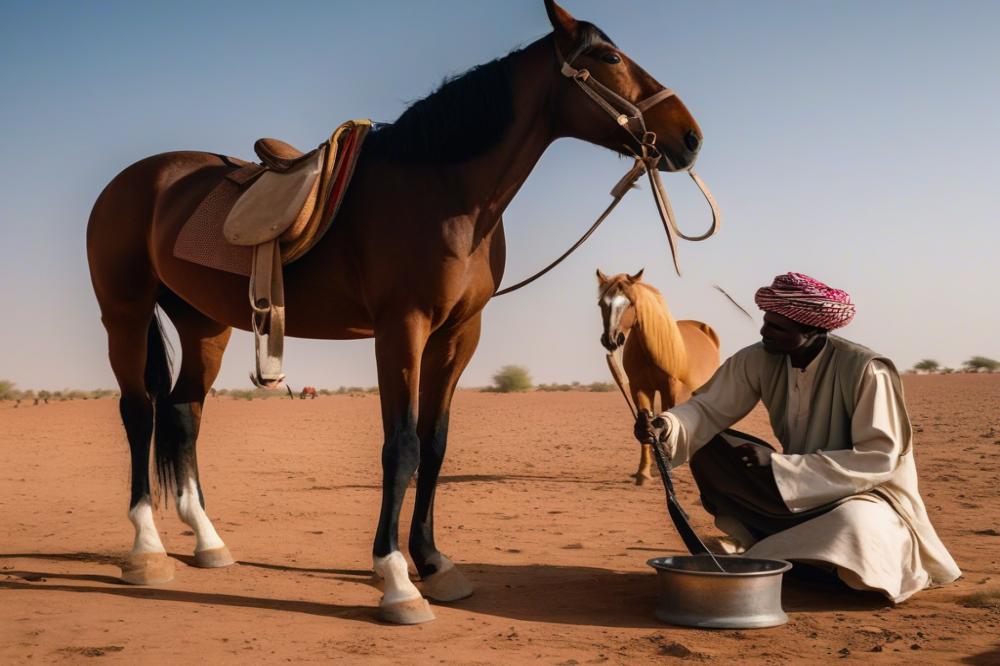Understanding the Role of farriers in Sudan
farriers play a crucial part in the equine world of Sudan. They are responsible for horse shoeing, which is essential for maintaining the health of these animals. Given the harsh desert conditions, the challenges they face are significant. In this arid landscape, intense heat and rocky terrain can be particularly tough on horse hooves. Without proper care, horses can suffer from various ailments that can hinder their performance and overall well-being.
Horses hold a prominent place in Sudanese culture and economy. They are not just means of transportation; they often symbolize status and are used in traditional ceremonies and celebrations. Moreover, many communities rely on these animals for work, such as herding livestock or in agricultural practices. As a result, the work of farriers becomes even more pivotal. They not only help keep horses fit but also support the livelihoods of families dependent on these animals.
Ensuring horses are well-shod can greatly enhance their ability to navigate the challenging desert environment. Specialized techniques are often employed to adapt to the specific needs of the local terrain. Utilizing materials that withstand extreme conditions is vital. The relationship between farriers and horse owners is built on trust and understanding. Each horse has unique requirements based on its activity level and the ground it travels.
Ultimately, horse shoeing is more than a skill; it is an art. The knowledge and expertise of these professionals are indispensable. They play a vital role in keeping the horses healthy and capable of fulfilling their essential roles in Sudanese society. With ongoing support and education, farriers can continue to thrive in their profession, ensuring the health of beloved horses across the region.
Understanding the Harsh desert conditions

The environment in Sudan presents many challenges for horses. Dry terrain stretches across vast areas, making travel difficult. Hot temperatures can soar during the day, often exceeding 100 degrees Fahrenheit. At night, it can drop significantly, creating a sharp contrast. This drastic change plays a role in the horses’ overall comfort.
Water is scarce in many regions. Horses often struggle to find enough hydration. Limited access to grass and other forage adds to their hardships. These conditions can directly impact their hoof health. Without proper nutrition and moisture, hooves can become brittle and weak.
When a horse’s hoof is healthy, it can better support the animal’s weight and movement. Yet, in a desert climate, the ground can be unforgiving. Hard surfaces can cause excessive wear and tear on hooves. Damage might occur faster than in more temperate environments. With such a unique landscape, specific shoeing techniques are crucial.
Farriers must adapt their methods to suit these challenges. Customized shoes help combat the harsh effects of the terrain. Protective footwear can mitigate the risk of injury. Materials chosen for the shoes also matter greatly. Durable options designed for extreme conditions offer more protection.
Maintaining hoof health is not just about the shoes. Regular checks and care are critical. Inconsistent foot care can lead to serious issues. Overall, these extreme conditions require a specialized approach to equine management.
Farrier Practices in Sudan

In Sudan, farriers play a crucial role in maintaining the health of horses. Shoe fitting is not just about style; it directly affects the animal’s well-being. The harsh desert environment presents unique challenges. Protecting hooves from rocky terrain and extreme heat is essential.
Traditional hoof care practices have been passed down for generations. Tools used include simple hoof knives and rasps made from local materials. Many farriers rely on their experience and knowledge of the land. Understanding local conditions helps them make the best decisions for shoeing a horse.
When it comes to techniques, they often start by examining the horse’s hooves closely. Understanding the wear and breakage allows them to choose the right type of shoes. Many will shape the shoes to fit the specific needs of the animal. This individualized approach is vital in a place where terrain can be unpredictable.
Some local methods differ from modern farriery practices seen in other parts of the world. In many cases, the shoes used may be handmade, providing a customized fit. This contrasts with mass-produced options found elsewhere. Adaptation to the surroundings is key for success here.
The use of herbal remedies for hoof care is also common. Many farriers apply natural treatments to combat infections or other issues. Conversely, some modern practices involve chemical treatments and advanced materials. Each method has its strengths, but traditional practices have stood the test of time.
Daily life for these professionals often means working in extreme conditions. Temperatures can soar in the desert sun, making the job even more challenging. Despite this, their dedication to horses remains steadfast. Often, farriers become a trusted part of a horse’s overall care team.
The Importance of Equine Health and Veterinary Support
Maintaining equine health is crucial, especially in the challenging climate of Sudan. Farriers play a key role in this ecosystem, working closely with veterinarians. Their collaboration is vital for overall horse well-being. Regular hoof care enables horses to perform at their best, which is important for both work and leisure.
Hoof health directly impacts a horse’s ability to move and function. Neglecting hoof care can lead to serious problems such as lameness or infections. This is where the relationship between farriers and veterinarians becomes essential. Each professional brings unique skills to the table. Veterinarians provide medical expertise, while hoof care specialists focus on the practical aspects of horse management.
Regular check-ups can spot early signs of issues. This proactive approach is beneficial for both the animal and its owner. When hoof problems are addressed quickly, it can prevent more serious conditions from developing. Proper care not only helps in maintaining soundness but also enhances performance.
Communication between these professionals is key. Regular discussions about specific cases optimize care strategies. Both parties must understand the individual needs of each horse. This partnership ultimately leads to better health outcomes.
Preventive measures can be taken through well-timed trimming and shoeing. These practices help to maintain a horse’s balance and posture. Farriers notice signs that may not be obvious to others. Their insights can alert veterinarians to underlying problems that require further investigation.
Education is also an important part of this relationship. Owners often need guidance on hoof care. Understanding how to care for a horse’s feet can reduce the chances of complications. A well-informed owner can support the efforts of both the farrier and veterinarian, creating a comprehensive care plan.
In the harsh desert environment, many factors can affect equine health. Conditions like heat and rough terrain can take a toll. Regular hoof care becomes even more crucial in such situations. This is where the unity of expertise shines, helping horses thrive despite adverse conditions.
Animal Welfare and Ethical Considerations
A strong sense of ethics guides the work of those who care for horses. Farriers play a vital role in maintaining the health and wellbeing of these animals. Their responsibilities extend beyond simply shoeing. Attention to the comfort of each horse is essential, especially in the challenging environments found in Sudan.
Humane shoeing practices are crucial. Using appropriate techniques helps prevent injury and discomfort. This involves selecting the right shoes and fitting them properly. A well-fitted shoe should not restrict movement or cause pain. Understanding the anatomy of horses can greatly influence how farriers approach shoeing in harsh conditions.
Education is key for anyone involved in horse care. Proper training programs teach valuable skills. They also cover the ethical implications of working with animals. Farriers who are well-trained are more likely to handle horses in a gentle manner. Learning about animal behaviors can foster better relationships between humans and their equine counterparts.
Being aware of the environmental challenges faced by horses in the desert is important. Excessive heat can lead to stress, which affects the animals’ overall health. Providing shade and water is just as important as proper shoeing. Knowledge about how to help horses cope with their surroundings enhances their quality of life.
Practicing empathy is crucial in this line of work. Farriers should always strive to listen to the needs of the animals they work with. Recognizing signs of discomfort or fear shows a commitment to welfare. Horses that feel cared for respond positively, making the shoeing process smoother.
Many resources are available to promote ethical treatment. Workshops and seminars can help expand knowledge. Networking with other professionals leads to shared experiences and insights. Ultimately, the welfare of the horses should be at the forefront of every farrier’s mind.
Horses in Sustainable Agriculture and Economic Impact
In Sudan, horses play a vital role in agriculture. They are often used for plowing fields and transporting goods. This reliance on equine labor supports sustainable farming practices. With the right care, these animals can significantly enhance productivity.
Well-maintained hooves contribute to better performance. Horses that are properly shod can work longer hours without suffering injuries. This efficiency helps farmers maximize their output. Increased agricultural productivity means more food and goods for local communities.
Moreover, the economic impact of hoof care is substantial. When horses are healthy and strong, they are more effective on the farm. Farmers can save money by reducing veterinary bills related to injuries. This savings can then be invested back into the farm.
Good hoof maintenance also leads to better animal welfare. Healthy horses mean happier families. Many farmers notice that their animals are more energetic and willing to work. This positive behavior translates into better farming outcomes.
In areas where drought can be a challenge, a dedicated horse provides stability. These animals can help transport water or supplies, lessening the burden on families. They become a crucial part of the survival strategy during tough times.
Access to proper farrier services is essential in achieving these benefits. Unfortunately, many farmers in remote areas might struggle to find these services. Training local individuals in hoof care can make a difference. It fosters self-sufficiency and creates new job opportunities.
Investing in horses and their care leads to community growth. More efficient agriculture can help uplift entire regions. This speaks to the importance of ensuring proper care for these hardworking animals.
Final Thoughts on the Impact of Farriers in Sudan
The role of those who shoe horses in Sudan is crucial, particularly when facing harsh desert conditions. These specialists are not just craftsmen; they are essential to the well-being of the animals they care for. In a land where the environment poses many challenges, the expertise of farriers contributes significantly to maintaining the health and mobility of horses.
Providing proper footwear is vital for preventing injuries and ensuring that horses can perform their tasks well. When horses are healthy and strong, they can support communities that rely on them for work, transport, and companionship. Thus, the work of these professionals has far-reaching effects on both animals and people.
Support for ongoing education is key. Training programs can help these skilled individuals learn new techniques and sustainable practices. This not only raises standards but also enhances the welfare of horses, allowing them to thrive under the demands of their environment.
Continued investment in the education of farriers is necessary for the future. Communities benefit when these experts are equipped with up-to-date knowledge and skills. By promoting sustainable practices, it becomes possible to adapt to changing conditions and optimize the care of equines.
In essence, the work being done by those who shoe horses in Sudan deserves recognition and support. By valuing their vital role, we can help ensure a brighter future for both horses and the communities that depend on them.



